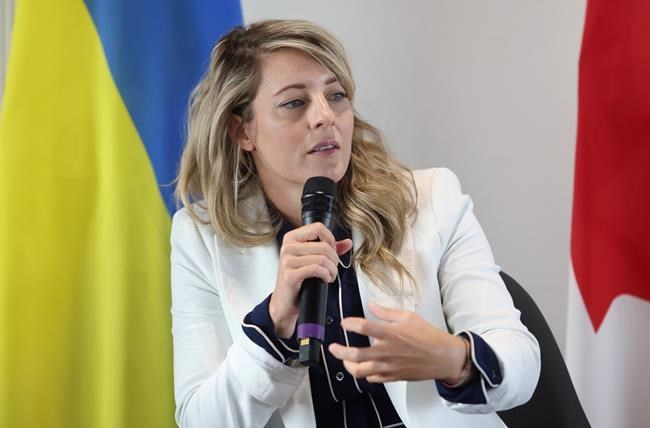OTTAWA — Foreign Affairs Minister Mélanie Joly paid a surprise visit to Ukraine on Friday to launch what she hopes will be a global effort to secure the return of Ukrainian children abducted by Russia.
"Our support to Ukraine's independent future remains unwavering," Joly told a news conference in Kyiv.
"Ukraine's supporters will stay the course; we cannot afford to lose confidence or waver, not even (for) a moment."
Next month marks the 10th anniversary of Russia's invasion of Crimea, and just over two years since Moscow began its full-scale invasion of Ukraine.
Joly met with her Ukrainian counterpart Dmytro Kuleba as well as President Volodymyr Zelenskyy.
The visit did not include any federal plans to top up the $9.7 billion that Ottawa has pledged to Ukraine through military, development and emigration programs since early 2022.
Instead, Joly launched an initiative that seeks global help pressuring Russia to return thousands of Ukrainian children it deported from conflict zones, in violation of international law.
The International Criminal Court issued an arrest warrant for Russian President Vladimir Putin nearly a year ago for allegedly forcing children in eastern Ukraine to be adopted into Russian families, while trying to strip them of any Ukrainian identity.
The United Nations has documented instances of Russian armed forces and affiliated armed groups committing grave violations against children, who have been unlawfully detained, forcibly transferred and illegally deported.
The new Canadian project aims to raise awareness of the issue and co-ordinate advocacy campaigns, with the hope other countries will follow suit.
"Canada will use its diplomatic network around the world to reach out, as if these were Canadian children," Joly said. Diplomats will discuss it with a wide variety of countries, including Mexico, Brazil, South Africa and Qatar, she added.
"We know this is no simple task, and it will require a co-ordinated effort from states in every corner of the world."
Ottawa also said it would offer any technical expertise Ukraine needs to help get children returned. Fewer than 400 have made it back from Russia so far.
"These children are being robbed of their families, of the love and security that every child needs from their loved ones," Joly said.
Before heading home Saturday, Joly is to meet with Ukrainians affected by the war, including children, as well as organizations that support victims of sexual and gender-based violence and war-related trauma.
Canada and its allies have pledged to support Ukraine for "as long as it takes," including support to contain the risk of Russian aggression after the eventual end to the conflict.
Yet public support for Ukraine has waned in places like the U.S. amid persistent inflation and war in the Middle East.
Canada still hasn't signed a formal bilateral security commitment for Ukraine, with negotiations persisting for months over how much Ottawa will commit to help secure the country.
Kuleba praised Ottawa's support, saying through an interpreter that "Canada is one of our closest friends," in part because it raises Ukraine's issues at G7 meetings.
He said negotiations for a security commitment are going well, and are not clouded by diplomatic niceties. "We can discuss things, in essence, quite sincerely and openly," he said.
Ukraine is enthusiastic about steps to have foreign countries seize assets owned by affiliates of the Russian state, which they would then forfeit to help finance Ukraine’s rebuilding effort.
Canada has promoted such a move for well over a year, though it hasn't followed through on actually forfeiting property.
It's been more than a year since Ottawa froze a US$26-million bank account held by Russian oligarch Roman Abramovich and seized a massive airplane last June that sits on the tarmac in Toronto.
Joly did not say why the assets have not yet been forfeited, although she alluded to a need for the legal process to play out.
The federal Conservatives said Friday that Ottawa should send Ukraine surplus weapons and follow through on a promise to increase the production of artillery shells.
The party homed in on a stockpile of what it says were thousands of CRV7 rockets slated for disposal. But the Department of National Defence said the 83,303 units are motors for rockets which the military can't assemble because it lacks the other components.
Nevertheless, the Tories say Ukraine still wants those arms, even if they require work to be repaired.
Prime Minister Justin Trudeau said Canada would continue to send arms to Ukraine, and suggested that delays in getting an air-defence system to the country are beyond his control.
"We know that Ukraine needs more and significant military support," Trudeau said Friday during an event in Waterloo, Ont.
"We will continue making sure that that (NASAMS) advances as quickly as possible, but it's not only on Canada."
This report by The Canadian Press was first published Feb. 2, 2024.
Dylan Robertson, The Canadian Press



